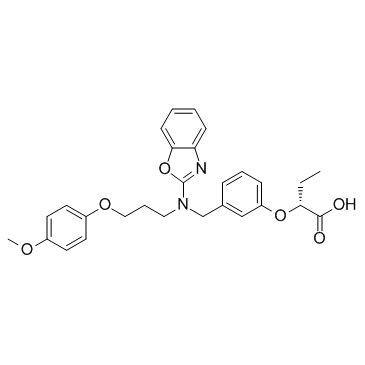848259-27-8
| Name | (2R)-2-[3-[[1,3-benzoxazol-2-yl-[3-(4-methoxyphenoxy)propyl]amino]methyl]phenoxy]butanoic acid |
|---|---|
| Synonyms |
unii-17vgg92r23
Pemafibrate |
| Description | Pemafibrate is a potent PPARα agonist, with EC50s of 1 nM, 1.10 μM and 1.58 μM for h-PPARα, h-PPARγ and h-PPARδ, respectively, and possesses lipid-lowering effect. |
|---|---|
| Related Catalog | |
| Target |
h-PPARα:1 nM (EC50) h-PPARγ:1.1 μM (EC50) PPARδ:1.58 μM (EC50) |
| In Vitro | Pemafibrate is a potent PPARα agonist, with EC50s of 1 nM, 1.10 μM and 1.58 μM for h-PPARα, h-PPARγ and h-PPARδ, respectively. Pemafibrate is more than 1000 fold selective towards PPARα than PPARγ and PPARδ[1]. |
| In Vivo | Pemafibrate (3 mg/kg, p.o.) increases plasma h-apoA-I in human apoA-I (h-apoA-I) transgenic mice, and shows higher levels of plasma h-apoA-I than fenofibrate at 300 mg/kg[1]. Pemafibrate (0.03 mg/kg) decreases levels of triglycerides and aspartate aminotransferase (AST) in PEMA-L (db/db) mice. Pemafibrate (0.1 mg/kg) not only shows such effects but increases liver weight in PEMA-H (db/db) mice. Pemafibrate enhances the pathogenesis in a rodent model of nonalcoholic steatohepatitis (NASH). Pemafibrate significantlly reduces the grade of hepatocyte ballooning in PEMA-H mice. Furthermore, Pemafibrate modulates lipid turnover and induces uncoupling protein 3 (UCP 3) expression in the liver[2]. Pemafibrate (K-877, 0.0005%) contained in high-fat diet (HFD) inhibits the body weight gain in mice. Pemafibrate significantly decreases the abundance of triglyceride (TG)-rich lipoproteins, including remnants, in postprandial plasma of mice. Pemafibrate also decreases intestinal mRNA expression of ApoB and Npc1l1[3]. |
| Animal Admin | Mice are fasted for 12 h and fasting blood glucose measured. Nine-week-old db/db mice are used in the assay. After a 2-week acclimatization period, mice are divided into four groups: BD (db/db) mice (fed basal diet (BD) and treated with 0.5% aqueous methylcellulose solution (MC); MCD (db/db) mice (fed methionine choline-deficient (MCD) and treated with 0.5% MC); PEMA-L (db/db) mice (fed MCD and treated with 0.03 mg/kg Pemafibrate); PEMA-H (db/db) mice (fed MCD and treated with 0.1 mg/kg Pemafibrate). The drug-free solvent or the dosing solution is administered to animals (5 mL/kg body weight, p.o.) once daily (in the morning) for 4 consecutive weeks. After a 2-week acclimatization period, BD mice are fed a BD for 20 weeks. CTRL mice are fed D09100301 for 20 weeks. PEMA-L and PEMA-H mice are fed D09100301 for 12 weeks followed by D09100301 with 0.4 mg and 1.3 mg Pemafibrate/kg of the diet for 8 weeks, which corresponds to 0.03 mg/kg/day and 0.1 mg/kg/day, respectively. FENO mice are fed D09100301 for 12 weeks followed by D09100301 with 666.7 mg fenofibrate/kg of the diet for 8 weeks, which corresponds to 50 mg/kg/day. Pemafibrate and fenofibrate are incorporated into the AMLN diet. Animals are housed under conventional conditions with controlled temperature, humidity, and light (12-h light-dark cycle) and provided with food and water[2]. |
| References |
| Molecular Formula | C28H30N2O6 |
|---|---|
| Molecular Weight | 490.54800 |
| Exact Mass | 490.21000 |
| PSA | 94.26000 |
| LogP | 5.55410 |
| Storage condition | 2-8℃ |
